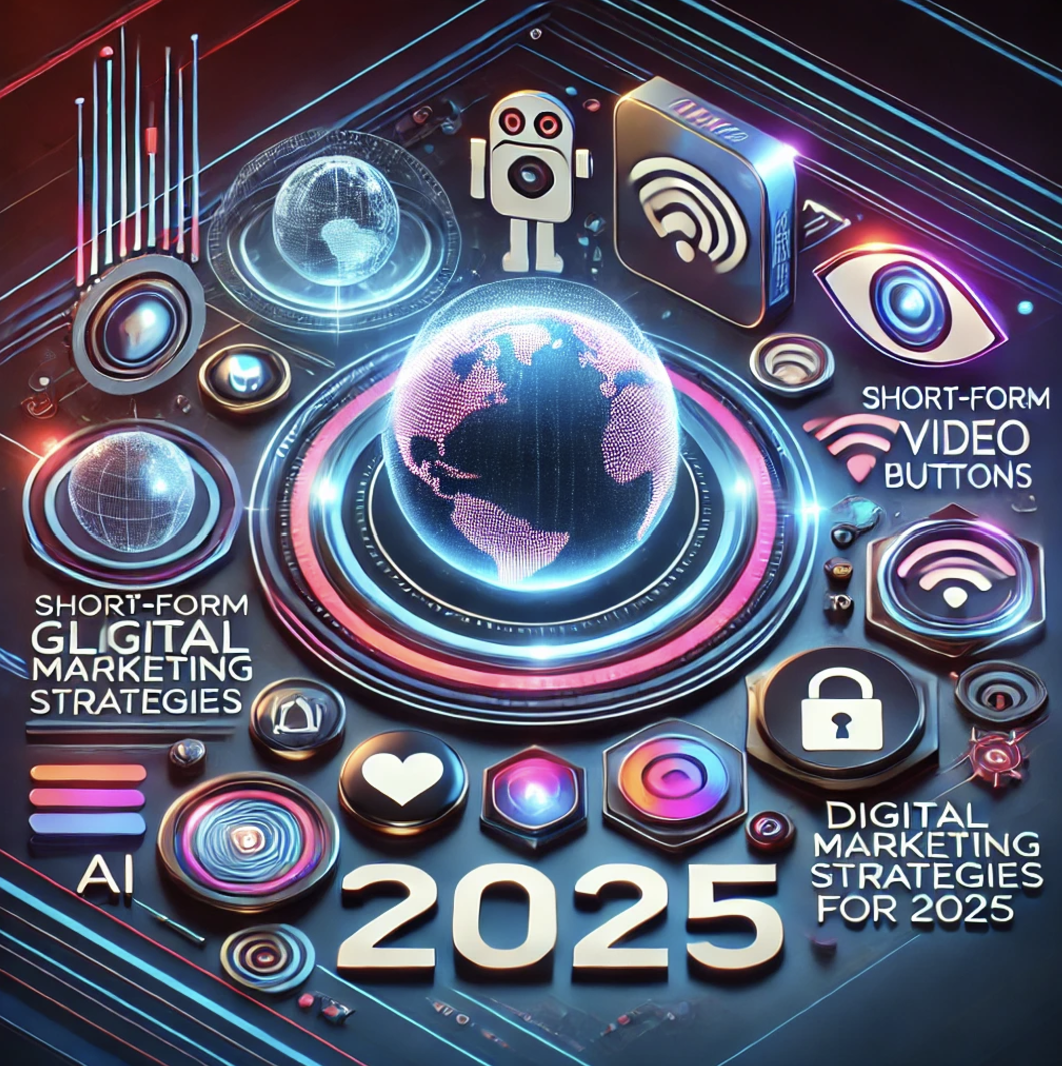The Future of Digital Marketing: Strategies for 20 …

As we approach 2025, digital marketing continues to evolve at breakneck speed, influenced by advancements in technology, shifting consumer behaviors, and new regulations. The strategies that once dominated the landscape are now adapting to the demands of a hyper-connected, privacy-conscious world. For digital marketing firms, staying ahead means embracing innovation while maintaining a sharp focus on customer-centric approaches.
This blog explores the key strategies expected to shape digital marketing in 2025 and how firms can prepare for the changes.
1. AI and Automation: Redefining Personalization
Hyper-Personalized Marketing
By 2025, Artificial Intelligence (AI) will play an even greater role in creating personalized marketing experiences. Marketers will use AI-driven insights to predict customer preferences, optimize campaigns, and deliver tailored content in real time. For instance, chatbots and AI assistants will handle more complex customer interactions, creating seamless brand experiences.
Programmatic Advertising
Automation will dominate paid advertising, with programmatic platforms allowing marketers to bid on ad placements in real time. These systems will leverage machine learning to ensure ads reach the right audience at the right moment, maximizing return on investment (ROI).
2. The Metaverse: New Frontier for Engagement
Immersive Experiences
The metaverse—a virtual world where users interact through avatars—will redefine customer engagement. Brands will create immersive experiences, such as virtual stores, interactive events, and gamified marketing campaigns. For example, a clothing brand might let users try on virtual outfits before making a purchase.
Metaverse Advertising
In 2025, digital marketing firms will explore opportunities to advertise in virtual environments. Sponsored experiences, branded virtual spaces, and product placements in metaverse games will become standard marketing strategies.
3. Content Marketing: Short-Form, Snackable, and Interactive
Short-Form Videos Rule
Short-form video content will remain dominant, thanks to platforms like TikTok, Instagram Reels, and YouTube Shorts. Marketers will focus on creating visually appealing, engaging, and concise videos that cater to dwindling attention spans.
Interactive Content
Interactive formats such as polls, quizzes, and augmented reality (AR) experiences will become integral to content strategies. These formats foster deeper audience engagement and collect valuable user data.
4. Voice and Visual Search Optimization
Voice Search
With the proliferation of smart speakers and voice assistants, optimizing for voice search will become a priority. Marketers will focus on natural language and long-tail keywords to ensure their content is discoverable through voice commands.
Visual Search
Visual search technology will gain traction, enabling users to search using images instead of text. Digital marketing firms will optimize product images and metadata to capitalize on this trend, especially in e-commerce.
5. Sustainability and Social Responsibility
Green Marketing
In 2025, consumers will expect brands to demonstrate their commitment to sustainability. Digital marketing firms will highlight eco-friendly practices and support for social causes in their campaigns. Transparency and authenticity will be critical to gaining consumer trust.
Inclusive Marketing
Inclusivity will remain a core value, with brands striving to reflect diversity in their messaging and imagery. Marketing campaigns will cater to diverse audiences, promoting equality and representation.
6. Privacy-First Strategies
Cookieless Tracking
As third-party cookies are phased out, marketers will turn to privacy-first solutions like first-party data, contextual advertising, and advanced analytics. Consent-driven marketing will become the norm, ensuring compliance with global privacy regulations.
Ethical Data Practices
In 2025, ethical data collection and usage will be a competitive advantage. Firms that prioritize transparency and respect consumer privacy will build stronger, long-term relationships with their audiences.
7. Omnichannel Marketing: Seamless Integration
Unified Customer Journeys
Consumers expect seamless experiences across channels. Omnichannel marketing strategies will integrate online and offline touchpoints, ensuring consistency in messaging and brand identity.
Connected Devices
With the Internet of Things (IoT) becoming more prevalent, marketers will explore new ways to reach audiences through connected devices. For example, a smart fridge might display personalized ads or recipe suggestions based on its contents.
8. Data-Driven Decision Making
Predictive Analytics
By 2025, predictive analytics will be central to marketing strategies. Firms will use historical data and AI to forecast trends, anticipate customer needs, and optimize campaigns.
Real-Time Insights
Real-time data analysis will allow marketers to adjust campaigns instantly, improving performance and relevance. Dashboards with AI-powered insights will enable better decision-making.
9. Emerging Platforms and Niches
Niche Social Media Platforms
While platforms like Facebook and Instagram will remain relevant, marketers will increasingly explore niche platforms catering to specific interests or demographics. For instance, platforms focused on gaming, hobbies, or professional networking will offer targeted advertising opportunities.
Podcasts and Audio Content
The popularity of podcasts and audio content will continue to grow, providing a new avenue for storytelling and brand building. Digital marketing firms will experiment with audio ads and branded podcasts to engage listeners.
10. Challenges Ahead
Ad Fatigue
As ad saturation increases, marketers will face the challenge of cutting through the noise. Creative, authentic, and value-driven campaigns will be essential to capturing attention.
Balancing Automation and Human Touch
While automation streamlines processes, maintaining a human touch will be critical for building meaningful connections. Digital marketing firms must strike a balance between efficiency and empathy.
Evolving Technologies
The rapid pace of technological change will require marketers to stay agile and continually upskill. Staying informed about emerging trends and tools will be a top priority.
Conclusion
The digital marketing landscape of 2025 promises to be dynamic and full of opportunities. Success will depend on the ability to adapt to new technologies, prioritize customer-centric approaches, and navigate challenges with creativity and agility.
Digital marketing firms that embrace innovation, foster trust, and deliver value will thrive in this ever-evolving field. By staying ahead of the curve and keeping the customer at the heart of every strategy, they can ensure long-term success in the competitive world of digital marketing.
